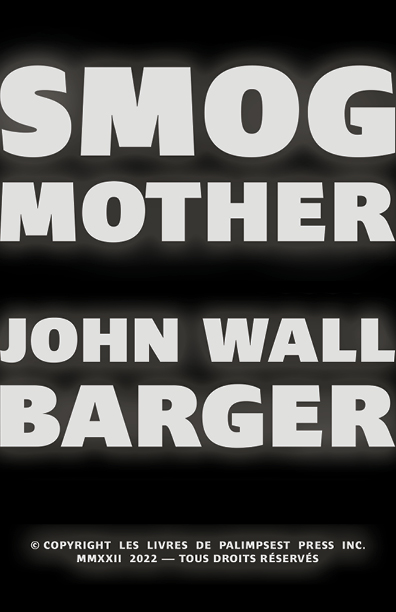 Review by Miriam Calleja
Review by Miriam Calleja
Smog Mother
by John Wall Barger
Palimpsest Press
ISBN-13: 978-1-990293-21-4, $18.95 US, Trade Paperback, September 2022
Described as “deadly serious and absolutely precise” on the blurb of the poetry book’s publisher Palimpsest Press, Smog Mother is a solid collection by the hands of a true poet, an exact observer, a restless traveler. Smog Mother is John Wall Barger’s sixth collection of poetry. The title poem was a 2017 co-winner of The Malahat Review’s 2017 Long Poem Prize. It sets the tone of examining the conscience in all its nitty-grittiness, self-destruction, cravings, successful and failed attempts.
Every thing that lives heaves out the smog
Smog hands in the air like a song
We step inside a fog of sleep
It is a cave we are its Minotaurs
Barger is self-critical [I/disheveled/hummingbird, absurd], yet he is more interested in others than himself. He plays an important part in bearing witness to their particular suffering. I wonder if anyone else has looked at these particular people that he observes with universal love.
In his eyes a dog tore free of its leash
and runs down cars and we know
how that ends.
and
I wish this were a different world—
one where we could lean on a stranger
without shame
The unsayable inevitably finds its way into Smog Mother, not just in fantastic dreams, but in the ugliness of life and death, in the rushing precipices we face and try not to. Barger takes the role of poet to the letter when he lets disaster unfold in his work. You can feel that he barely blinks in the face of this darkness, not because he is unfeeling, but to take it all in.
Nobody is crying. Where is your mother?
In another section prefaced by the long poem ‘Samovar’ – a huge charcoal-heated kettle, in this case on the Trans-Mongolian rail trip – the focal point is a beast of a poem half incantation half delirious fever-dream. We travel with it, days turning into tomorrows, the past splashing back like acid in the back of your throat. The sense of place changes, we move we move. Here Barger shows his wordsmithery, the rhythm of his lines propelling the reader forward.
framed by the smeared train glass, dawn crowns
out of the mother goat of night
on her knees in Siberia.
While there is so much to unravel in Barger’s words, what really made my heart stagger is his ability to capture an all-encompassing view of a moment, without shame, without sanitising or spicing it up for the reader. And, as readers, we might teeter on the line between morbid interest in that which is not our daily life, to an almost-sexual pleasure of voyeurism. In his lines and line breaks, Barger creates feelings that are hard to pin down. And so, while as a reviewer I struggled to lay these thoughts on paper, one might be better off exploring this work which makes a niche and museum of itself:
It is forbidden
to love hurt things
more than nature does.
But joy, joy is the taproot.
We are allowed
to feel it. From my roof
I hear them, yipping.
That satyric chorus.
The bliss born of agony.
About the reviewer: Miriam Calleja is the bilingual author of poetry collections Pomegranate Heart(EDE Books, 2015) and Inside Skin (a two-book series in collaboration with a lith photographer, EDE Books 2016). Her most recent poetry collections are Stranger Intimacy (Stamparija Reljic, 2020) and the collaborative art book Luftmeer (2021) published in Maastricht. Holland.Her work has been published in translation in the collection Wara Settembru(2018, Slovene Writers Association) and in the collection Anthology of Young Maltese Poets (Vakxikon, 2019).